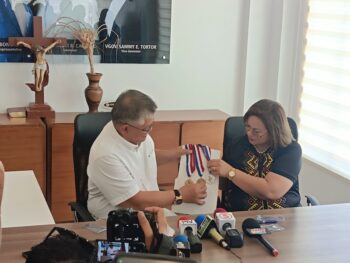Mohagher Iqbal, chair of the MILF peace panel told MindaNews the issue at present are the consensus points on ancestral domain.
“Dureza is speaking of GRP (Government of the Republic of the Philippines) way of implementing peace pact with MILF. But we have not started discussing the political package. We are still glued to ancestral domain aspect of Tripoli Agreement,” reminded Iqbal.
Asked why he was proposing something that was not agreed upon during the negotiations, Dureza, former peace panel chair, told MindaNews, “federalism is just a proposed framework to open up amendments that will later on deal with specific results of what will come out of the agreements that the present Constitution will not allow.”
Dureza clarified to MindaNews Saturday noon that his proposal does not refer to changing the form of governance from presidential to federal.
In a press statement issued by the Office of the Presidential Adviser on the Peace Process (OPAPP) dated January 11, Dureza said they are proposing that “the setting up of a Bangsamoro federal unit be the only item in the Charter change move to insure its passage through bipartisan support.”
Dureza, according to the press statement, was the proponent of a move to amend the Constitution to install a federal governance unit “as a way forward in the negotiations with the Moro Islamic Liberation Front.”
In November 2007, Dureza was so optimistic about the peace process that he came up with a “best case scenario” that would have the provisions of the unimplemented 1996 peace agreement between the government and Moro National Liberation Front and the government-MILF peace pact, merged by end of March 2008.
The peace talks between the government and the MILF ended on an impasse in September 2006 over the issue on territory, one of four aspects of the ancestral domain agenda aside from concept, resources and governance. The impasse was broken, 13 months later, in October 2007, through a compromise on what would constitute the MILF-proposed Bangsamoro Juridical Entity “now” and “later.”
Based on the consensus points, the two panels were supposed to finalize the draft of the memorandum of agreement on ancestral domain, starting with the November 2007 meeting. The December 15-16 meeting in Kuala Lumpur, however, did not push through because the MILF refused to meet with the government panel even if they were in the same hotel.
Iqbal told MindaNews they opted to call off the meeting because the government’s draft agreement, sent to the MILF through the Malaysian facilitator towards midnight of December 15, was a “chop-chop of the consensus points” and contained “new elements” and the “constitutional process” phrase.
The OPAPP press statement quoted Dureza as saying there appears to be a “wide bipartisan support for the setting up of a Bangsamoro federal governance unit in Southern Philippines and efforts be taken to insulate it from the political fray.”
Dureza said the Senate and the House of Representatives “may convene as a constituent assembly by passing an enabling resolution which will specify that they will propose amendments to the Constitution that will deal only or exclusively with the Bangsamoro federal issue and nothing more.”
He said this will douse speculations that other amendments would be taken up or that Charter Change efforts have “hidden agenda.”
“We will not proceed with our plan if there will be other items that will be considered in the proposed constituent assembly,” the OPAPP press statement quoted Dureza as saying.
“I understand the reservations and apprehensions raised by some senators and congressmen about Charter change at this time. But to me, this is a welcome note as this will ensure that in passing the enabling resolution that will set in motion the amendment, they themselves will provide the safeguards to insure that there will be no other matter inserted in their amendatory agenda,” he said.
Dureza explained that peace settlement with the MILF “is a common aspiration for Mindanaoans and for the Arroyo government and amending some provisions of the Constitution will clear the way for a meaningful and comprehensive peace agreement.”
Prof. Abhoud Syed Lingga, executive director of the Institute on Bangsamoro Studies, told MindaNews government “should refrain from using political labels like autonomy, federalism, etc.. because it might limit exploration of power sharing arrangements.”
“The issue is not autonomy or federalism because these are political labels, but power sharing,” he said.
MILF peace panel member Datu Michael Mastura, a lawyer and historian, said the MILF position is “more direct, less cumbersome, i.e. Protocol, not Constitutional framework.”
Mastura said the “Dureza/GRP formula presupposes legalism, hence (he) anchors his discourse on constitutionality issue, but misses the point that this is a political question so legitimacy of process is more important, not legality.”
The government’s approach, he said, “is purely legalistic treatment of Constitutional issues in relation to the conflict. They overlook the political and legal history of the Constitution and how the Constitution produced the conflict. Our young lawyers say the Constitution helped create and perpetuate the conflict. Proposal for Bangsamoro federative asymmetry is putting the horse before the horse. To simplify, what is contentious is not constitutionality issue. It’s a political question.”
Lawyer Mary Ann Arnado, secretary-general of the Mindanao Peoples’ Caucus, asked, “what federal state is (Dureza) going to offer? Government cannot even commit to the consensus points on ancestral domain, how much more federal? He’s muddling the peace talks.” (Carolyn O. Arguillas/MindaNews)
